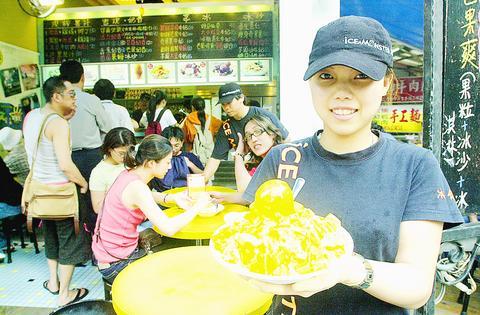Ice Monster (
"I have confidence in the franchise project since Japanese tourists constitute 40 percent of our customer base," Frank Lo (
The first overseas Ice Monster branch may open in spring next year in Tokyo's Shibuya district depending on how quick the Japanese authorities approve of the food-safety of his recipe, Lo said.

PHOTO: GEORGE TSORNG
One franchise owner yesterday said that breaking into the Japanese market would require tailoring products for the Japanese palate.
"Flavors that can be accepted by consumers in that country is a prerequisite," said Johnson Fu (
Fu has franchised out over 700 pearl-milk-tea shops to the US and Asia.
He said challenges may lie ahead for Ice Monster, adding, "A product that sells well in Taipei may not necessarily be successful in Japan."
While the innovative use of chopped mango stacked on shaved ice may have been the latest snack craze five years ago when it first hit the domestic market, Lo said he has been mixing mango and condensed milk into the traditional ice concoction as a summer snack since he was a child.
However, he never expected that his homemade ice recipe could be a marketable franchise.
One customer standing in line in 32?C heat yesterday waiting to munch down a mango ice said she came to Ice Monster -- as opposed to five others in the vicinity -- for two reasons.
"Ice Monster tastes better and, besides, they have the reputation," said Yvonne Fang (
Lo opened his ice stand in its current location in 1995 on Yungkang Street, but came close to shutting it after three years due to poor sales.
His financial woes drove Lo to develop a new flavor -- mango -- at NT$100 per plate.
"The new product soon boosted my business as queues of customers flocked to my door after being told by word-of-mouth by guests who had tried it," Lo said.
In addition to the streams of ice gluttons that consume on average 1,500 plates of shaved ice per day, Lo's mango ice also brought media exposure such as the Japanese food show TV Champion, which put him on the Japanese tourist map, Lo said.
Lo sparked a host of copycats also selling shaved mango ice.
The basic product is quite simple: sliced mango, condensed milk and his homemade syrup.
Lo admits his mango ice has nothing different in it from other ice shops.
"When people ask me about the secret to my success, I always tell them that it was an accident," he said. "Freshness is the key."
Unlike other ice shops that have developed into chain stores nationwide, Lo said he would not mass produce his product until the quality is assured.
Lo has until recently put off a two-year old plan to start the franchise project.
If his mango ice business flies in Japan, however, Lo said he will try to bring the sweet fruit taste to Hawaii and southern California's sizeable Japanese population.

The US dollar was trading at NT$29.7 at 10am today on the Taipei Foreign Exchange, as the New Taiwan dollar gained NT$1.364 from the previous close last week. The NT dollar continued to rise today, after surging 3.07 percent on Friday. After opening at NT$30.91, the NT dollar gained more than NT$1 in just 15 minutes, briefly passing the NT$30 mark. Before the US Department of the Treasury's semi-annual currency report came out, expectations that the NT dollar would keep rising were already building. The NT dollar on Friday closed at NT$31.064, up by NT$0.953 — a 3.07 percent single-day gain. Today,

‘SHORT TERM’: The local currency would likely remain strong in the near term, driven by anticipated US trade pressure, capital inflows and expectations of a US Fed rate cut The US dollar is expected to fall below NT$30 in the near term, as traders anticipate increased pressure from Washington for Taiwan to allow the New Taiwan dollar to appreciate, Cathay United Bank (國泰世華銀行) chief economist Lin Chi-chao (林啟超) said. Following a sharp drop in the greenback against the NT dollar on Friday, Lin told the Central News Agency that the local currency is likely to remain strong in the short term, driven in part by market psychology surrounding anticipated US policy pressure. On Friday, the US dollar fell NT$0.953, or 3.07 percent, closing at NT$31.064 — its lowest level since Jan.

The New Taiwan dollar and Taiwanese stocks surged on signs that trade tensions between the world’s top two economies might start easing and as US tech earnings boosted the outlook of the nation’s semiconductor exports. The NT dollar strengthened as much as 3.8 percent versus the US dollar to 30.815, the biggest intraday gain since January 2011, closing at NT$31.064. The benchmark TAIEX jumped 2.73 percent to outperform the region’s equity gauges. Outlook for global trade improved after China said it is assessing possible trade talks with the US, providing a boost for the nation’s currency and shares. As the NT dollar

The Financial Supervisory Commission (FSC) yesterday met with some of the nation’s largest insurance companies as a skyrocketing New Taiwan dollar piles pressure on their hundreds of billions of dollars in US bond investments. The commission has asked some life insurance firms, among the biggest Asian holders of US debt, to discuss how the rapidly strengthening NT dollar has impacted their operations, people familiar with the matter said. The meeting took place as the NT dollar jumped as much as 5 percent yesterday, its biggest intraday gain in more than three decades. The local currency surged as exporters rushed to